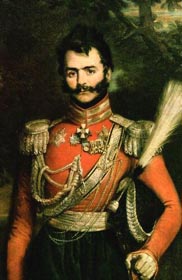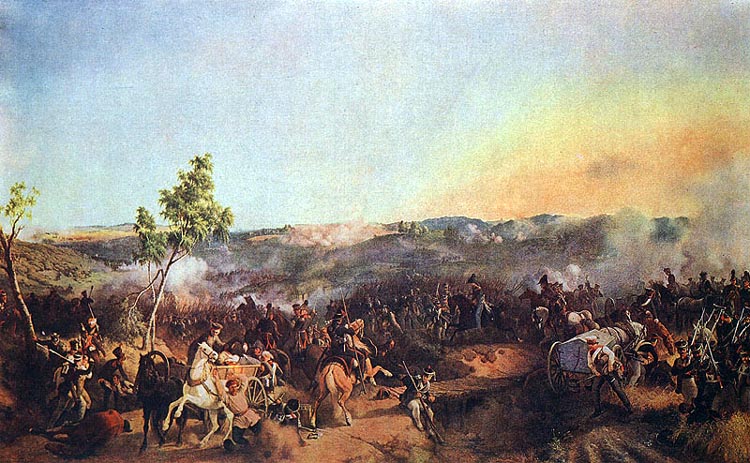August, 19 (August,7)
(From P.A.Zhilin "The Patriotic War Of 1812",
E.V.Tarle, Complete Works, Volume VII, "Napoleon's Invasion to Russia", Moscow 1959)
The capture of Smolensk showed Napoleon the big advantages of his strategy. First: the Russians lost important defensive lines, such as Smolensk and all the Smolensk region. Second: He obtained a strong base from which he would be able to develop future actions, because the main roads connecting Russia with the West crossed in Smolensk.

Major-General P.A.Tuchkov (the 3rd) |

General-Quartermaster K.F.Toll |

General V.V.Orlov-Denisov |
| The portraits by Dow | ||
But it was necessary to use these advantages carefully. Berthier and Caulaincourt, who were very close to Napoleon, advised him persistently not to be carried away with pursuit of the retreating Russians, deep into their territory, but to stop in Smolensk on the banks of the Dnieper and reform the army, putting the rear organizations in order and solving the administrative problems in the captured areas.
But all these plans vanished as quickly as they appeared. It was not enough for Napoleon to make the first small tactical success. He was eager for the big general battle and the subsequent final victory. The prospect of general battle at Lubino (10 kilometers East of Smolensk) drove Napoleon to move his army once again after the retreating Russian forces.
Here is how it developed:
The 1st Western Russian army moved along country roads from the Porechskaya road to the Moscow high road in two columns. One went through the villages Krakhotkino, Zhabino, Koshaevo and came to Lubino and Bredikhino. The second went through Zykolino and Sushevo to Prudishevo. The detachment under the command of Major-General P.A.Tuchkov (the 3rd) was in the vanguard of the first column. On August,18 it came to the Moscow high road near Lubino. The detachment then had to go eastwards to Bredikhino. But Tuchkov, wanting to better protect the movement of the main forces, turned his detachment to the west and went along the road towards Smolensk. At the same time the French Corps of Marshal Junot (that had crossed the Dnieper by the new bridge at Prudishevo) was movind along the Moscow road to Lubino.

The battle at Valutina Hill (Lubino).
From the picture by Hess
General Tuchkov was told by General-Quartermaster K.F.Tol that there were no troops before the forces of the 2nd Russian army except three cossack regiments of General A.A.Karpov, and at the same time the French forces of the Ney's Corps, sent by Napoleon, were approaching the Moscow road too.
General Tuchkov clearly understood that the succes of the 1st Russian army manoeuver depended on his actions and decided to delay the movement of the enemy troops. He disposed his forces in an advantageous position beyond the Stragan river. An artillery battery was placed on the road and opened fire on the approaching troops of Marshal Ney. Exchange of fire commenced and became stronger as the French troops came nearer. It was, of course, very difficult for the Tuchkov's detachment of only three thousand soldiers to hold these positions. Besides the French infantry of Junot and the cavalry of Murat were coming turning the left flank. But the Russian command kept an eye on Tuchkov's detachment and sent them new reinforcements, one after another. By 3 p.m. there were near 8 thousand Russian troops beyond the Stragan river. Shortly, Barclay de Tolly and General Ermolov came there too.
The fighting on the Moscow road became more and more stubborn. Marshal Ney tried to overrun Tuchkov's detachment, and the troops of Konovnitsyn moved to capture the village of Lubino by a quick rush to open the way for the 1st Western army. The cavalry of Marshal Murat hurried to the Moscow road too and tried to turn the left Russian flank. But the 1st Cavalry Corps of General V.V.Orlov-Denisov was sent to meet them and it used the country's impassable swamps skillfully, delaying the movement of Murat's cavalry. Murat's cavalry would damage the troops of the Russian 1st Army seriously if it had the support of Junot's infantry. But Junot was facing a marsh and refused to move his troops forward. Neither would he agree to go in a roundabout way. There were no results to Murat's urgent requests for help.
Napoleon,in Smolensk, was very angry when he heard of Junot's actions. He cried: "Junot has missed the Russians! I am losing the whole campaign because of him!" (1)
- Caulaincourt A. Collected works, page 116